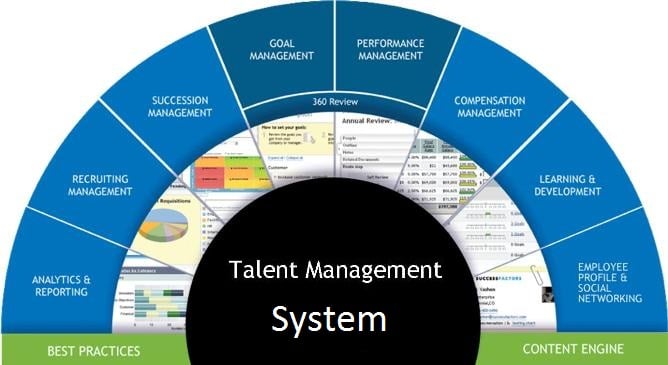
Managing human resources efficiently is essential to both business success and employee well-being. However, handling all the administrative processes across the entire employee lifecycle can be overwhelming. As workers increasingly expect quick, efficient management and a positive employee experience, talent management systems (TMS) have become indispensable tools for HR teams. These systems help streamline workflows and ensure smooth operations while allowing HR professionals to focus on strategic priorities.
If you haven’t yet implemented a talent management system, here’s a guide to what it is, the key features it offers, and how it can benefit your organization.
What Is Talent Management?
Talent management, sometimes referred to as human capital management, is a strategic approach aimed at attracting, retaining, and engaging employees to ensure business productivity, high retention rates, candidate attraction, and effective succession planning. These practices include a variety of HR processes and strategies that differ based on a company’s unique needs and structure.


What Is a Talent Management System?
A talent management system (TMS) is a digital solution designed to simplify, streamline, and automate talent management processes. It helps HR teams monitor employee engagement, track productivity, and ensure the effectiveness of HR strategies. These systems are typically cloud-based and can go by different names, such as Applicant Tracking Systems (ATS), Human Resource Information Systems (HRIS), or Human Resource Management Systems (HRMS). While each type of platform has unique features, all talent management systems share core functions to improve HR operations.
Key Components of a Talent Management System
Every company has specific HR needs, and an ideal TMS should simplify day-to-day management while enhancing productivity. Below are key features that most talent management systems should include:

1.Talent Acquisition and Onboarding
Recruiting top talent and ensuring their smooth integration into the company is crucial for any organization. Some TMS platforms include features like job postings, automated emails, and candidate databases that integrate with job boards and career pages. Additionally, onboarding modules help automate administrative tasks and streamline the new hire experience, improving retention rates by as much as 16%.
2. Employee Performance Management
A strong TMS should include performance management tools that allow HR teams to track employee progress, streamline appraisals, and align individual goals with the company’s overall objectives. These systems encourage regular check-ins and help adjust goals as needed, fostering accountability and recognition, which leads to a more positive workplace culture.
3. Compensation Management
Managing compensation and benefits can be complex. A good TMS can either integrate with payroll systems to avoid duplication and errors or offer its own payroll features to automate compensation processes. This functionality is critical for simplifying pay management and ensuring accuracy.
4. Career Development
Offering career growth opportunities is key to retaining top talent. TMS platforms often include career development modules that track employee progress, manage training budgets, and automate reminders for certifications. Some solutions even incorporate Learning Management Systems (LMS), allowing for comprehensive tracking of employees’ learning and development throughout their careers.
5. Workforce Planning
Workforce planning involves analyzing skill gaps and forecasting talent needs to achieve strategic objectives. A TMS provides HR teams with data-driven insights and Key Performance Indicators (KPIs), enabling them to visualize their workforce’s skills and demographics. These insights guide long-term talent strategies and support overall organizational health.
Benefits of Implementing a Talent Management System
Beyond automating administrative tasks, talent management systems offer a range of tangible benefits, including:
Higher Retention Rates: A significant percentage of employees leave their jobs because they feel their well-being is not a priority. A TMS helps create a supportive environment that reduces turnover by focusing on employee satisfaction and development.
Improved Productivity: By aligning individual and company goals and ensuring that skills are used effectively, performance management features enhance overall productivity. Employees are more motivated when they feel their growth is being supported.
Enhanced Corporate Culture: A well-functioning TMS reflects positively on your organization’s corporate culture, not just to current employees but also to potential hires. When HR processes are efficient and employee needs are well-managed, it builds trust and strengthens your reputation.
Greater Flexibility: Talent management systems enable more flexible HR practices. Employees can handle their requests remotely, and employers can address HR challenges efficiently, making the workplace more adaptable to changing needs.


How to Choose the Right Talent Management System
Selecting the right TMS for your organization can be a daunting task. Here are five steps to help you make the best decision:
1. Build a Criteria Checklist
Start by outlining your organization’s most important HR needs. Rank the features you’re looking for in a TMS, whether that’s talent acquisition, performance management, or compensation. Understanding the gaps in your current system will help you build a comprehensive checklist.
2. Compare Budget and Pricing
Define your budget before you begin researching TMS platforms. Compare the costs of various systems, and if necessary, adjust your priorities to fit within your financial constraints. Keep track of the solutions that meet your needs without exceeding your budget.
3. Check Integration Capabilities
Most TMS platforms integrate with other systems, such as payroll or existing HR software. Consider integration capabilities when selecting a platform to ensure that implementation is seamless and efficient.
4. Consider Your Business Context
Some talent management solutions are tailored to specific industries or company sizes. Choose a platform that understands your business context and offers features designed to meet your unique challenges.
5. Request Demonstrations and Meet Providers
Once you have a shortlist of TMS providers, schedule demos to see how each platform works in practice. Evaluate whether the provider understands your company’s needs and whether their customer support team would be a good fit for a long-term partnership.
Conclusion
Talent management systems are becoming essential for organizations that want to stay competitive by improving HR operations, employee satisfaction, and overall productivity. Implementing a TMS now can help your organization thrive by automating administrative processes and providing strategic insights into your workforce.
Talent Development LMS, a leader in learning and development solutions, supports organizations by offering comprehensive tools that manage everything from recruitment to career development. Our specialized solutions include Talent Development Software, LMS for colleges, LMS for schools, LMS for corporations, and more. Whether you’re looking to streamline onboarding or enhance employee engagement, Talent Development LMS is committed to helping your organization succeed in today’s evolving business landscape.


